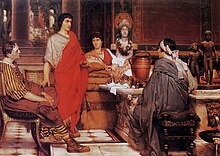Sappho 31
φαίνεταί μοι κῆνος ἴσος θέοισιν ἔμμεν᾽ ὤνηρ, ὄττις ἐνάντιός τοι ἰσδάνει καὶ πλάσιον ἆδυ φωνεί- σας ὐπακούει
καὶ γελαίσας ἰμέροεν, τό μ᾽ ἦ μὰν καρδίαν ἐν στήθεσιν ἐπτόαισεν· ὠς γὰρ ἔς σ᾽ ἴδω βρόχε᾽, ὤς με φώναι- σ᾽ οὐδ᾽ ἒν ἔτ᾽ εἴκει,
ἀλλ᾽ ἄκαν μὲν γλῶσσα †ἔαγε†, λέπτον δ᾽ αὔτικα χρῶι πῦρ ὐπαδεδρόμηκεν, ὀππάτεσσι δ᾽ οὐδ᾽ ἒν ὄρημμ᾽, ἐπιρρόμ- βεισι δ᾽ ἄκουαι,
ἀλλὰ πὰν τόλματον ἐπεὶ †καὶ πένητα† "That man seems to me to be equal to the gods who is sitting opposite you and hears you nearby speaking sweetly
[18] Anne Carson argues that Sappho has no wish to take the man's place, nor is she concerned that he will usurp hers: thus, she is not jealous of him, but amazed at his ability to retain his composure so close to the object of her desire.
[23] D'Angour's reading, on the other hand, offers as a secondary option the change of tone in the poem towards a more hopeful, rather than resigned, position.
An alternative reading is suggested by Gallavotti: according to his thesis, the text was corrupted over time as a result of the disappearance of the sound [w] (represented by the letter digamma Ϝ) and Sappho's original would have instead said phainetai woi (φαίνεταί ϝοι).
[25] This reading of the original text, which may be supported by a quote by Apollonius Dyscolus, would dramatically change the perspective of the first verse, its translation roughly being: "God-like he esteems himself to be".
In ancient Rome, the poet Catullus adapted it into his 51st poem, putting his muse Lesbia into the role of Sappho's beloved.
[37] In the nineteenth century, the poem began to be seen as an exemplar of Romantic lyric,[38] influencing poets such as Tennyson, whose "Eleänore" and "Fatima" were both inspired by fragment 31.
[39] Other Romantic poets influenced by the fragment include Shelley and Keats – for instance in "To Constantia, singing" and "Ode to a Nightingale", respectively.
